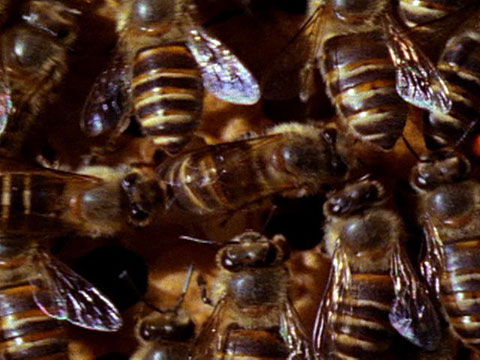WEIRD ANIMAL QUESTION OF THE WEEK
Do Animals Go to War?
In the brutal animal kingdom, chimpanzees gang up to expand territory and ants raid other colonies to take slaves.

A matabele ant carries its termite prey during a raid in Rio Kapatchez, Guinea.
PHOTOGRAPH BY PIOTR NASKRECKI, NATIONAL GEOGRAPHICS
As we enjoy the return of Star Wars and its big-screen battles, is there also wee warfare going on under our feet?
Saturday’s Weird Animal Question of the Week is pondering this question after Elli Coates wrote in after seeing what he thought were termites in the African bush.
"We were told they were going to war to eradicate a nearby ant [colony]. Would that have been true? Are there creatures out there that do go to war, other than humans?”
Tiny Terrors
Actually, “termites do not raid ants. It is rather the reverse,” Abdullahi Ahmed Yusuf, an entomologist at the University of Pretoria in South Africa, says by email. (See "How Do Termites Build Their Huge Structures?")
For instance, matabele ants prey on termites, storming their colonies in huge numbers. But Yusuf says it’s a hunting strategy—not what we would call war.
Slave-making ants—yes, that's actually their common name—also stage raids on other ant species, notes Katy Prudic, an entomologist at Arizona State University.

Japanese giant hornets assault the hives of their prey, Japanese honeybees.
PHOTOGRAPH BY NOBUO MATSUMURA, ALAMY
“They put out a perfume that is a mimic” of the host ants’ alarm scent, making their victims panic and leave their nests. This allows the slave-makers to come in and steal the host’s brood, which will grow up to serve the raiding ants. (Related: "The Rebellion of the Ant Slaves.")
Other social insects mount attacks, too, Prudic says. Japanese giant hornets assault the hives of their prey, Japanese honeybees. The bees retaliate by swarming lone hornet scouts with vibrating wings.
“The vibrating honeybees heat the hornet above its thermal tolerance,” Prudic says: “Basically, they cook it.” (See: "'Hot Bee Balls' Cook Enemy Hornets—But How Do They Endure the Heat?")
Sometimes, adds University of Florida entomologist Philip Koehler, perceived enemies get along. For instance, “it's common for ants and termites to cohabit nests,” he says by email.
Guerilla Chimps
Do other animals go to war? Since our close relative the chimpanzee is often thought of as war-like, we took the question to Nicholas E. Newton-Fisher, a primate behavioral ecologist at the University of Kent.
“It probably depends on the definition of ‘war,'” Newton-Fisher says by email. “There’s good evidence that chimpanzees conduct deliberate raids on neighbouring communities, and that this can lead to annexing of territory."
For instance, during a ten-year study of a chimp family in Uganda's Kibale National Park, the primates killed or injured 18 chimps from other groups and took over their land. (Related: "Chimp Gangs Kill to Expand Territory.")

Some chimpanzees in Uganda (pictured, animals in Tanzania's Gombe Stream National Park) have been observed ganging up and killing chimps in neighboring groups.
PHOTOGRAPH BY GERRY ELLIS, NATIONAL GEOGRAPHIC
“The behaviour of chimpanzees is much more akin to a guerrilla band"—wearing down the enemy—than what we think of as a traditional battle, Newton-Fisher says.
Unlike humans, chimps don't “form into opposing armies, and fight it out to see who wins,” nor do “two communities ally to defeat a third.”
Animal groups do compete over resources, sometimes in an organized way, but “war” implies something more formal, Dan Dembiec, supervisor of mammals at the Jacksonville Zoo and Gardens, says via email.
Bottom line? The term "war" is “inappropriate to describe conflict in the non-human animal kingdom,” he says.
We're ok with that—as long as they don’t fight for the Dark Side.
Comment on This Story

